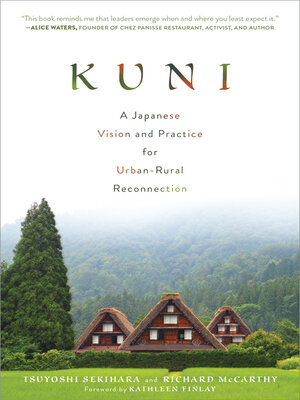
Sign up to save your library
With an OverDrive account, you can save your favorite libraries for at-a-glance information about availability. Find out more about OverDrive accounts.
Find this title in Libby, the library reading app by OverDrive.



Search for a digital library with this title
Title found at these libraries:
| Library Name | Distance |
|---|---|
| Loading... |
“Reading Kuni makes me want to dive into rural Japan...this book reminds me that leaders emerge when and where you least expect it.”
— ALICE WATERS, founder of Chez Panisse restaurant, activist, and author
A guide to reviving and revitalizing forgotten places and communities through the Japanese principles of kuni
Kuni offers a unique model for the revitalization of rural and deindustrialized lands and communities—and shares lessons in citizen-led regeneration for all of us, regardless of where we live.
“Kuni” is both a reimagining of the Japanese word for nation and an approach to reviving communities. It shows what happens when dedicated people band together and invest their hearts, minds, and souls back into a community, modeling a new way of living that actually works. A kuni can be created anywhere—even a hamlet on the verge of extinction—and embodies 7 key principles:
Everyone is equal in a kuni Kuni is equipped with a Regional Management Organization—a democratic organization that takes care of small public services Kuni is a link between residents and repeat visitors Life in a kuni is circular—consumption and production are in balance Kuni embraces the whole person Kuni can be a place for young people who seek interconnectedness The time for kuni is now
Kuni offers a compelling vision of regenerative relationships that can take root in the United States—and anywhere. With spare and beautiful prose and useful principles for reviving rural places, this book addresses our longing for a hopeful revolution of everyday life.
— ALICE WATERS, founder of Chez Panisse restaurant, activist, and author
A guide to reviving and revitalizing forgotten places and communities through the Japanese principles of kuni
Kuni offers a unique model for the revitalization of rural and deindustrialized lands and communities—and shares lessons in citizen-led regeneration for all of us, regardless of where we live.
“Kuni” is both a reimagining of the Japanese word for nation and an approach to reviving communities. It shows what happens when dedicated people band together and invest their hearts, minds, and souls back into a community, modeling a new way of living that actually works. A kuni can be created anywhere—even a hamlet on the verge of extinction—and embodies 7 key principles:
Kuni offers a compelling vision of regenerative relationships that can take root in the United States—and anywhere. With spare and beautiful prose and useful principles for reviving rural places, this book addresses our longing for a hopeful revolution of everyday life.







